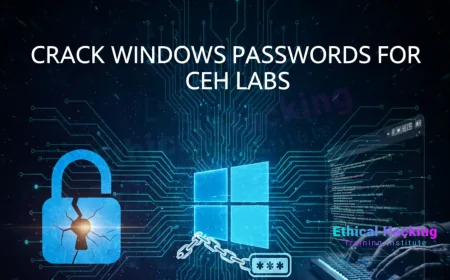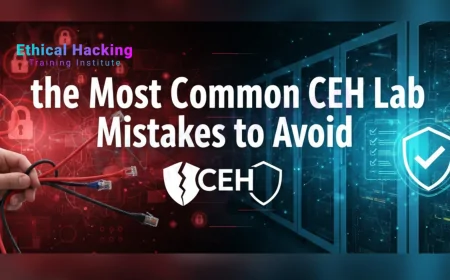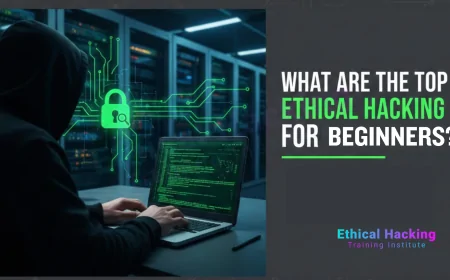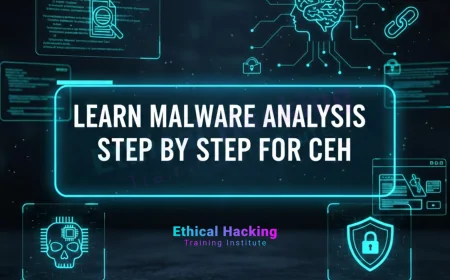Ethical Hacker Training: Where to Start and What to Expect | Beginner’s Roadmap to Ethical Hacker Training and Career Development
Begin your ethical hacking journey with a complete guide to training paths, tools, certifications, and expectations. Learn how to become a skilled and certified ethical hacker.
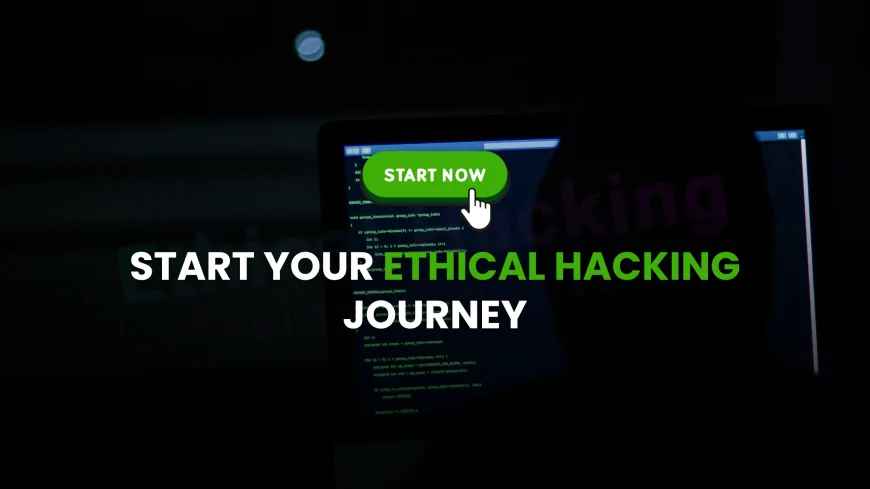
Table of Contents
- Introduction
- Why Ethical Hacking?
- Prerequisites & Skill Basics
- Choosing a Training Path
- Curriculum Overview
- Tools & Virtual Labs
- Training Formats
- Key Certifications
- Personal Study Plan
- What to Expect in Training
- Early Career & Roles
- Mentorship & Community
- Challenges & How to Tackle Them
- Advanced Learning Pathways
- FAQs
- Conclusion
Introduction
It’s a proactive and authorized approach to testing system defenses and ensuring cybersecurity resilience. Whether you're new to cybersecurity or aiming to upskill, ethical hacker training offers structured, hands-on guidance to develop critical thinking, technical expertise, and professional credibility in cybersecurity.
Why Ethical Hacking?
- Proactive defense: Find and fix issues before attackers do.
- High demand: Organizations need skilled ethical hackers to protect data and infrastructure.
- Skill diversity: Combines networking, scripting, reverse engineering, and more.
- Career progression: Opens roles like Pen Tester, Security Analyst, and Cybersecurity Consultant.
Prerequisites & Skill Basics
Starting ethical hacking generally requires:
- Basic networking understanding (TCP/IP, DNS, subnetting)
- Comfort with operating systems—especially Linux and Windows
- Foundational scripting ability (Bash, Python)
- Curiosity, adaptability, and attention to detail
Choosing a Training Path
There are several training routes:
- Self-study: Books, tutorials, labs using free tools.
- Online courses: On demand or live sessions with labs.
- Bootcamps: Intensive, fast-paced training with mentorship.
- College programs: Formal cybersecurity degrees.
- Cert-focused: Certifications like CEH, OSCP, CompTIA Pentest+.
Curriculum Overview
Typical ethical hacking training covers:
- Reconnaissance & Footprinting
- Network scanning & enumeration
- Password cracking & privilege escalation
- Web vulnerabilities: XSS, SQLi, CSRF, SSRF
- Wireless & mobile security
- Exploitation frameworks & scripting
- Cryptography fundamentals
- Malware & reverse engineering
- Social engineering and phishing
- Penetration testing methodology & reporting
Tools & Virtual Labs
You’ll practice using:
- Nmap, Wireshark: Nmap detects devices and open ports; Wireshark captures and dissects network traffic.
- Metasploit: Exploitation framework.
- Burp Suite, OWASP ZAP: Web application testing.
- Aircrack-ng: Wireless hacking.
- John the Ripper, Hashcat: Password cracking.
- IDA Pro, Ghidra: Reverse engineering.
Labs are provided via platforms like EC-Council iLabs, TryHackMe, Hack The Box, or self-hosted VMs.
Training Formats
- Self-Paced Online: Flexible learning at your own speed.
- Instructor-Led Live: Scheduled classes and Q&A.
- Bootcamps: Rapid-paced, immersive sessions.
- Hybrid: Mix of live and self-paced.
- Academic: Semester-based university programs.
Key Certifications
- CEH: Foundational, intermediate-level cert.
- CompTIA Pentest+: Emphasizes practical pen testing.
- OSCP: Heavy on hands-on, self-directed hacking.
- eJPT: Entry-level, performance-based test.
- CREST, GPEN: Advanced regional certificates.
Personal Study Plan
- Dedicate time weekly for video, reading, labs.
- Practice labs immediately after concepts.
- Solve challenges on platforms like TryHackMe.
- Join communities for peer learning.
- Assess progress periodically with mock exams.
What to Expect in Training
- Steady increase in difficulty—from scanning to exploitation.
- Extensive hands-on sessions with guided instructions.
- Frequent quizzes, mini-projects, and CTF-style challenges.
- Practical assignments that reinforce theory.
- Final exam or capstone involving real-world simulations.
Early Career & Roles
After training you could start as:
- Junior Penetration Tester
- Security Analyst
- SOC Team Member
- Bug bounty participant
Build your portfolio via labs, CTFs, or freelance bug bounties.
Mentorship & Community
Community engagement helps immensely. Join Discord/Slack groups, attend local cybersecurity meetups, and find mentors who can guide your growth.
Challenges & How to Tackle Them
- Information overload: Focus on one domain at a time.
- Lab complexity: Use guided walkthroughs first.
- Motivation dip: Set small, achievable goals.
- Imposter syndrome: Celebrate small wins and share progress.
Advanced Learning Pathways
Once comfortable, move into:
- CEH Practical or OSCP for hands-on skills
- ECSA or LPT for framework-based pen testing
- Specializations in web app sec, cloud sec, or IoT hacking
- Leadership certificates like CISSP or CISM
FAQs
1. How do I start ethical hacking with no experience?
Begin with networking basics, Linux, and scripting. Then take beginner-friendly courses like eJPT or TryHackMe paths.
2. What’s the difference between CEH and OSCP?
CEH is more theoretical with guided labs, while OSCP is intensely practical and self-driven.
3. Can I learn ethical hacking for free?
Yes—use free platforms (TryHackMe, YouTube tutorials), but structured training accelerates progress.
4. Do I need coding skills?
Basic scripting in Python or Bash is invaluable; proficiency grows with time.
5. How long does it take to become competent?
Typically 6–12 months with consistent study and practice.
6. Can I do it part-time?
Absolutely—regular weekday/evening study works well.
7. Will labs work on my computer?
Cloud labs won’t need much local setup, though VPN and lightweight VMs help.
8. What tools do I need?
Install Kali Linux, Wireshark, Nmap, Burp Suite, Metasploit, Hashcat, etc.
9. What jobs can I get after training?
Roles include junior pen tester, security analyst, SOC engineer, or bug bounty hunter.
10. How do I practice legally?
Only test on systems you own or have permission to test.
11. What is a CTF?
Capture The Flag—gamified security challenges to practice skills in real scenarios.
12. Is ethical hacking legal?
Yes, when done with authorization; unauthorized hacking is illegal.
13. Can I freelance?
Yes—get early experience with bug bounties and small consulting gigs.
14. How important is scripting?
It helps automate tasks and understand exploits—strong scripting skills are beneficial.
15. Should I join communities?
Definitely—connecting with peers and mentors accelerates learning.
16. How do I avoid burnout?
Take regular breaks, vary learning methods, and set small milestones.
17. Do I need certifications?
Certifications help with credibility and job opportunities but shouldn't replace real skill practice.
18. How do I track progress?
Use dashboards, CTF rankings, lab completions, and self-assessment quizzes.
19. What is pen testing methodology?
Structured approach: Recon, Scanning, Exploitation, Post-Exploitation, Reporting.
20. What’s the next step after basic training?
Pursue advanced certs like OSCP, specialize in domains, and deepen hands-on experience.
Conclusion
Ethical hacker training provides structured, experiential learning essential for a cybersecurity career. Beginning with fundamentals, tools, and labs, and progressing through advanced certifications, your journey should focus on hard skills, practical experience, and community involvement. With persistence, guidance, and real-world practice, you’ll build a strong foundation for a successful ethical hacking profession.
What's Your Reaction?
 Like
1
Like
1
 Dislike
0
Dislike
0
 Love
0
Love
0
 Funny
0
Funny
0
 Angry
0
Angry
0
 Sad
0
Sad
0
 Wow
0
Wow
0






